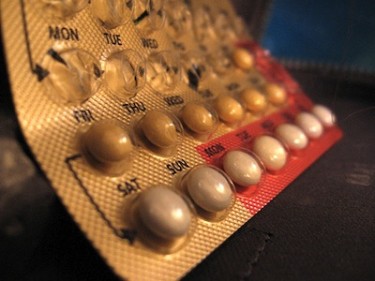The Korean Food and Drug Administration announced on May 7, 2012, that emergency contraceptives, known as morning-after pills, will become available for purchase over the counter. However, it has made non-emergency oral contraceptives, which were over the counter in the past, prescription-only drugs. An emergency contraceptive prescription will still be required for teenagers.
These sudden changes regarding drug regulations have sparked heated discussions online. While there are still debates going on about the risks and effectiveness of emergency contraceptives among medical communities, many South Korean net users have expressed dissents on the reversal. As quoted in a Hangyoreh [ko] news article, woman rights organizations and especially young unmarried women, have criticized the decision as making the sale of conventional contraceptives extra inconvenient.
Twitter user @redparco reminded [ko] people of the social stigma on unmarried women visiting gynaecologists in South Korean society, which is still relatively conservative and patriarchal:
유럽은 다들 그렇게 하고 있다는 얘길 하려면 한국에서도 그 나라들처럼 부인과 진료나 사전,사후 피임약의 접근성이 좋아져야지. 한국 미혼 여성들이 사전 피임약 처방 받으러 산부인과 자연스럽게 드나들 수 있는 분위기나 마련하고 할 말이지.
@marisusa came up [ko] with a similar argument:
[…] 사후피임약이라는 단어 뉘앙스가 피임책임을 여성 일방에게만 지우는 방식으로 악용될 우려가
ThinkThink, after inviting other users to join a discussion, speculated [ko] that the sudden shift in policy has been driven by profit maximization, rather than care for public health. Shin Jae-eun commented right below the net user's post:
병원처방이 필요해지면 남의 눈 의식하다보니 못가기도 할꺼고 피임률은 줄고 오히려 낙태률이 높아질듯 싶네요[…]진짜 적극 반대네요.
While a majority of net users warn about the danger of emergency contraceptives, sometimes referring to them as a ‘hormone bomb’, Twitter user @__mangmang tweeted [ko] [note: This link no longer exists]:
사후피임약은 그야말로 ‘응급'피임약이고, 일반의약품으로 전환되는 건 옳다고 생각한다. 그러나 경구피임약(사전 복용)이 전문의약품화되면 10대들, 작은 공동체에 사는 비수도권 여성들의 피임약 구매는 현실적으로 더 어려워질 거다.
Beside women's rights groups, the Catholic Church is also resisting the decision. The Catholic Church in Chungcheong Province even held a protest in front of the Food and Drug Administration building, warning that [emergency contraceptive] pills could hurt the morals of people and give wrong lessons on the value of life especially to teenagers – an argument a lots of Twitter users do not buy into.
사후피임약 일반의약품 판매로 성문란,낙태조장을 주장하는 가톨릭은 […] 현실감각이 없는건지,이 나라 불법낙태와 해외입양율 보면 이미 최고수준인데 왠 상상력?사전피임못함 사후라도 해야니 긴급,응급피임약인데 72시간내 먹는게 낙태란건 과장이 심해
The reversed policy on the contraceptives is expected to come into effect as early as next year.








4 comments